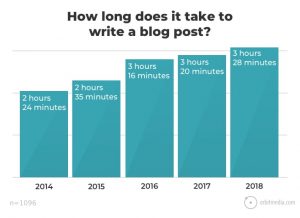Last updated February 2019
Anyone that spends much time online knows a simple truth: the internet is vast and awash in content. One estimate puts the total number of blogs online at over 500 million. For businesses doing content marketing, that means the competition is fierce.
vast and awash in content. One estimate puts the total number of blogs online at over 500 million. For businesses doing content marketing, that means the competition is fierce.
To be clear, that doesn’t mean that business blogging isn’t well worth it. Business blogging has been found to produce 55% more traffic, 97% more inbound links, and 67% more leads. But those results aren’t guaranteed. You can’t just put up a blog post and hope for the best. The more content that gets published on the web, the more important it is to take a strategic approach to the content you put out there.
If your business has a blog, there’s no getting around it. You need a business blogging strategy.
The Difference a Business Blogging Strategy Makes
Every year the Content Marketing Institute publishes new research about the state of content marketing, and while every year the research reveals some new trends and priorities, one insight stays consistent: the importance of having a documented strategy
That’s true for content marketing in general, and just as true for business blogging in particular.
If you started a blog because you kept hearing businesses were supposed to have a blog, then you may have overlooked this crucial step in the rush to check a box on your business to-do list. But if you didn’t take time to figure out what you want your blog posts to accomplish, and how to match your efforts to those goals, then you probably aren’t seeing the results you felt you were promised.
A business blogging strategy accomplishes a number of important things:
- It helps you maintain blogging consistency. One of the goals of a blog is that it gives your visitors something to come back for, and consistency is important for that. If you publish three blog posts in a week and then nothing for several months, people won’t know what to expect and are less likely to check back. A business blogging strategy will help you plan out your scheduling and keep up with it over time.
- You can better tie your blogging efforts to SEO (search engine optimization) results. For many businesses, SEO is the main goal of starting a business blog. But getting onto page one in Google for popular search terms is extremely competitive—it doesn’t happen by chance and luck. To increase your visibility in search, you need a strong blogging strategy.
- You can connect your business blogging to your other marketing efforts. A blog can be a powerful tool on its own, but it’s worth even more to your business if your blogging supports your efforts to build an email list, grow your social following and get better ROI for your paid search and social ads. That only happens if you’re strategic in how you approach your blogging.
- You’ll more thoughtfully provide what your audience wants. You know your industry, which makes it tempting to think you know what topics to cover in your blog. But you’re not writing content for yourself, it’s for your audience. Creating a blog strategy will help you think carefully about who your audience is and what they care about, so you can center them in your blogging.
How to Create Your Business Blogging Strategy
To create a strong blogging strategy for your business, carefully consider and answer these seven main questions.
1. What are my business blogging goals?
A blog can be a valuable tool in bringing in new leads and customers, but most of your blog visitors won’t go straight from reading one blog post to making a purchase. So while increased sales can be an ultimate goal for your blog, when it comes to creating your business blogging strategy, consider more intermediary goals you can set that help contribute to eventual sales, such as:
- Higher search rankings
- Backlinks
- Traffic
- Email subscribers
- Comments
- Social shares
A blog has to help you gain more visibility and traffic before it can lead to sales. And signs of engagement, such as comments and social shares, are signals that visitors are starting to build a relationship with your brand—often a step on the path to becoming a customer.
Take time at this step to figure out what you really want your blog to accomplish. Do you want potential customers to have an easier time finding you? Do you want to build more of a relationship with the visitors that already come to your website? Having multiple goals is fine, but figure out what your priorities are. That will help you shape your strategy to better accomplish the main results you want to see.
2. Who am I writing for?
Hint: it’s not you. You can absolutely create a blog that’s all about the things you’re most interested in – but it shouldn’t be on your business website. Your business blog has to be about what your audience cares about.
If you haven’t already created a buyer persona for your marketing strategies, then create one now for your blog. It will help you clarify who your target audience is, and then better understand what their problems are, what questions they have, and the types of things they normally like to read and do online and in the world at large.
You want your blogging strategy to reflect your business goals, but for it to do that, you’ll need to take a step back and make sure you don’t make your blog all about your business. What you blog about and how you write needs to center your audience first and foremost.
3. What does my audience care about?
You really want to get inside their heads here (as much as you can without being creepy, anyway). If you’re a local business in a city full of people with local pride, that should come through in your business blog. If your audience is moms who care about the environment and worry about the ecological effects of every product they buy, your blog should share that concern (and provide information that helps them make informed choices).
Do your research.
- Pull up websites you know your customers like and look at what posts and articles are the most popular.
- Read the comments that people in your audience write on those sites.
- Spend time in forums.
- Have conversations with your customers and prospects directly.
Keep a running list where you collect everything you learn so you can make sure you’re blogging about the things they care about.
4. What keywords do I want to rank for?
If SEO was anywhere on your list of goals, then keyword research should be a key part of your business blogging strategy. Keyword research helps you figure out what topics your audience cares about, and the language they most frequently use when searching for information on those topics.
The keywords you uncover in your research will help you shape your strategy around the concepts your audience is interested in, and will help you create a plan for gaining the search rankings that are the most valuable for your business.
When identifying keywords for your blogging strategy, give as much priority to long-tail keywords as you do broader, more popular keywords. A good SEO strategy is built as much on answering more detailed and specific questions as it is on providing pages that address the main general topics in your industry. For example, a company that sells time tracking software may want to consider terms like “how to have more productive meetings” as well as terms like “time tracking software.”
5. What are my competitors doing?
You have two categories of competitors: your business competitors and your blog competitors. There may be overlap, but you want to especially pay attention to the latter in this category. When you do searches for the target keywords you’ve identified, make note of who shows up the most often.
You have a lot to learn from the businesses winning the top spots in your industry in search. Analyze their blogs. Which blog posts are the most popular? How long is the typical post? How do they format each blog post? And what can you learn about how they distribute and promote their posts?
SEO tools offer features to help with competitor research. You can get a list of the keywords your top competitors are ranking for, learn which keywords send the most traffic to their website, and see what backlinks they have. All of that information can help you build out a stronger blogging strategy based on what you know works.
6. What’s my (realistic) blogging schedule?
The fact is, research shows that more frequent blogging tends to get better results. Businesses that manage to publish 16 or more blog posts a month got 3.5 times more traffic than those who publish 0-4.

Image via HubSpot
For many businesses, that’s inconvenient knowledge, especially as research also shows that the time it takes to create a high-quality blog post grows every year.

Image via Orbit Media
While publishing fresh content frequently can often add up to better business blogging results, that’s only true if the content is good and you keep up with it. A lot of businesses don’t have the bandwidth for daily blogging, and if you try to push out a high-quality longform blog post every day, you’ll get burned out pretty quickly.
The ideal isn’t to produce as much content as you possibly can, it’s to produce as much good, worthwhile content as you reasonably can. Setting your sights too high in terms of quantity will mean an abandoned blog or junk content no one wants read.
Carefully consider how much time you really have, how much time your employees really have, and how much you can afford to spend on a good freelance blogger. Then create a blogging schedule that you can realistically manage.
7. How am I going to promote my blog posts?
Don’t overlook this step. It’s one of the big things that sets successful blogs apart from those that fail. People have a lot of content to choose from out there. How are they going to find yours if you don’t create a plan to get it in front of them?
Content promotion can take a number of different forms. Some common strategies include:
- Sharing all of your blog posts on social media.
- Using paid advertising to drive traffic to your blog posts.
- Promoting your blog posts to your email list.
- Writing guest posts that link back to your blog posts.
- Highlighting industry influencers in your blog posts, so they’ll help with the sharing.
Whatever tactics you decide to go with, make sure your business blogging strategy includes room for promotion, both in terms of time and budget.
A Business Blogging Strategy is Key to Success
Starting a blog is easy enough, but doing blogging that yields tangible results for your business is hard. Anyone who says otherwise is misleading you. If you’re going to invest in a blog, be willing to invest enough to make it worth it.
My free report on building a better blog is a good place to start in visualizing your larger business blogging strategy. If you could use some help with the content writing, side of things, I may be able to help.
 Language can be so complicated, can’t it? Especially when you’re dealing with words that are new and still evolving. The word “blog” only just came onto the scene in 1997. The first use of “social media” may have beat it by a few years, but the evidence of its earliest use is unclear. These are words that apply to technology that keeps evolving. And even as the technology itself evolves at a rapid pace, the way we use it changes even faster.
Language can be so complicated, can’t it? Especially when you’re dealing with words that are new and still evolving. The word “blog” only just came onto the scene in 1997. The first use of “social media” may have beat it by a few years, but the evidence of its earliest use is unclear. These are words that apply to technology that keeps evolving. And even as the technology itself evolves at a rapid pace, the way we use it changes even faster.

 vast and awash in content.
vast and awash in content. 

